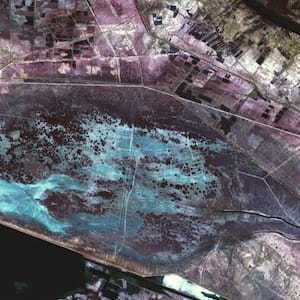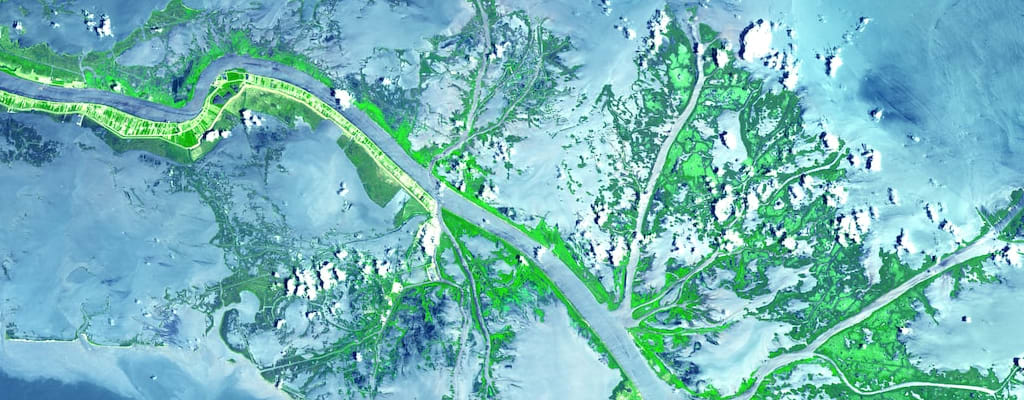edge of the earth: Idiom Meaning and Origin
What does ‘edge of the earth’ mean?
The idiom "edge of the earth" is used to describe a feeling of being in a remote, isolated, or faraway place, as if one is at the very limit or furthest point of existence or civilization.

Idiom Explorer
The idiom "off the face of the earth" means to disappear or vanish completely, as if someone or something has been wiped out or eradicated without a trace.
The idiom "lay of the land" refers to understanding or becoming familiar with a situation or environment. It implies gaining knowledge about the current state, conditions, or dynamics of a particular situation or place.
The idiom "in the world" is used to emphasize something by placing it in a broader context. It implies that there is no greater or more extreme example of that thing anywhere else.
An idiom used to describe someone who is in an emotional or mental state of extreme agitation, distress, or confusion.
The idiom "home away from home" refers to a place where one feels comfortable and at ease, as if it were their own home, despite being away from their actual residence.
The idiom "hell on earth" refers to a situation or place that is extremely unpleasant, chaotic, or filled with suffering, resembling the horrors commonly associated with the concept of hell.
The idiom "great beyond" refers to the unknown or beyond what is known or comprehensible. It implies something that is beyond the scope of our understanding or beyond the limits of our knowledge. It can also refer to the afterlife or the world beyond death.
The idiom "go to the ends of the earth" means to do everything possible or make extreme efforts to achieve or find something.
An idiom used to describe someone leaving or departing. It implies a physical or metaphorical departure from a place or situation.
The idiom "God's green earth" refers to the entire world or the whole earth. It is often used when expressing surprise or emphasizing a point.
Periphery Unveiled
The idiom "edge of the earth" embodies the idea of reaching the farthest point or boundary of existence. It is used metaphorically to describe a sense of adventure or exploration, pushing the limits of what we know.
In ancient cosmology, people believed that the earth was a flat disc or a sphere with a flat surface. They thought that there was an edge or boundary beyond which the earth ended abruptly. This idea of the edge of the world has captivated the human imagination for centuries.
While the exact origin of the phrase is uncertain, it can be found in various literary works throughout history. For example, in the medieval poem "Sir Gawain and the Green Knight," the protagonist embarks on a perilous journey to find the "Green Chapel" located at the "edge of the earth."
As our understanding of the earth has evolved, the concept of the "edge of the earth" has taken on a new meaning. It now represents the limits of our knowledge and the desire to explore the unknown. This idiom urges us to go beyond our comfort zones and seek new horizons.
Over time, the idiom "edge of the earth" has become a popular metaphor for the pursuit of discovery and pushing ourselves to the limits. It embodies a sense of curiosity, adventure, and the quest for the extraordinary. It encourages us to venture into uncharted territories and take risks in order to expand our horizons.
The idiom "off the face of the earth" is closely related to the concept of the "edge of the earth." It implies disappearance or isolation. When someone is "off the face of the earth," they are completely unreachable or untraceable. It's as if they have vanished into the vast unknown. This idiom emphasizes the idea of being at the farthest point of existence, beyond anyone's reach.
The idiom "arse end of nowhere" is another related phrase that conveys a similar meaning. It describes a place that is extremely remote or isolated, far away from civilization. When we say that something is in the "arse end of nowhere," we mean that it is located in a desolate and difficult-to-reach location. This idiom paints a picture of being at the very edge of the known world, far removed from society.
Lastly, the idiom "go to the ends of the earth" complements the notion of the "edge of the earth." It expresses the idea of going to great lengths or making extreme efforts to achieve a goal. When we say that we are willing to "go to the ends of the earth" for someone or something, we mean that we are ready to do whatever it takes, even if it means facing challenges or going beyond what is considered possible.
These idioms all relate to the concept of the "edge of the earth" in different ways. They reflect our fascination with exploring the unknown, pushing our limits, and embarking on adventurous journeys. While our scientific understanding may reveal the true nature of our world, the idiom "edge of the earth" continues to captivate our imagination, reminding us of the ever-present possibility of the undiscovered.
Example usage
Examples of how the idiom "edge of the earth" can be used in a sentence:
- She felt like she had reached the edge of the earth when she stood on the cliff overlooking the vast ocean.
- The explorers were determined to reach the edge of the earth and discover what lay beyond.
- He believed his love for her could move mountains and take them to the edge of the earth.
More "Geography" idioms



